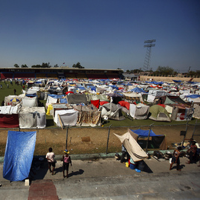Over the past several decades, responses to major disasters have become an important responsibility of the international community. In that time, the global disaster-response system has evolved to cope with the increased human and material consequences of geophysical events. Nevertheless, shortcomings of the current system have become increasingly apparent and must be addressed in order to strengthen it. Much of the discussion of how to do so contrasts centralized global solutions with decentralized regional solutions. To get a better idea of the relative merits of both approaches, it is necessary first to understand the key components and overall architecture of the current global response system.
Humankind and Nature
Disasters lie at the juncture of an external shock and a population physically at risk. A volcanic eruption in Iceland does not qualify as a disaster in this sense: Even though it can seriously disrupt international air transport and affect the global economy, Icelanders themselves are physically secure. A population's level of risk depends in part on its exposure to an external shock -- for instance, proximity to the epicenter of an earthquake or residence in a coastal area hit by a tsunami or a cyclone. Risk is also determined by vulnerability, which occurs when populations have limited capacities to offset risk -- in other words, limited resilience. Depending on the nature of the disaster, resilience is enhanced by a combination of factors, including immunity, knowledge resulting from the experience of past disasters, coping mechanisms, access to alternative livelihoods, construction standards, entitlements and access to relief.

